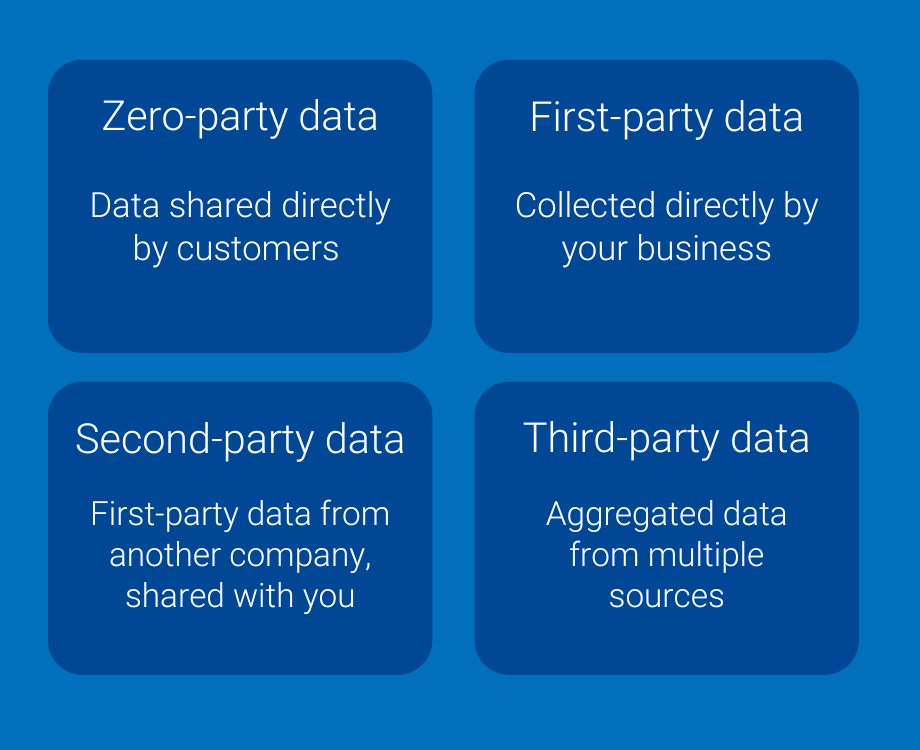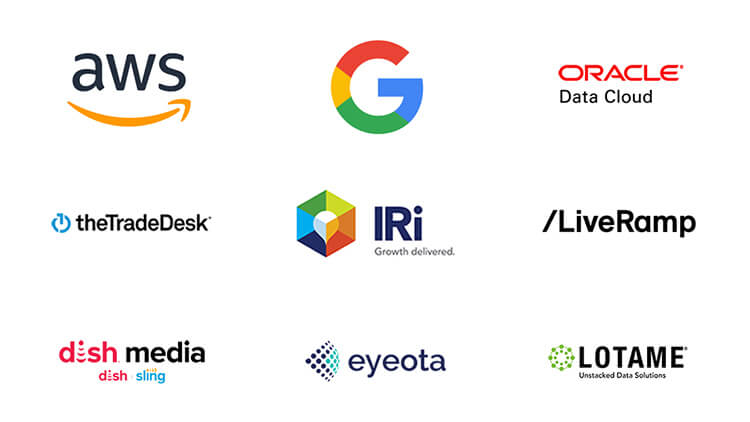How first-party data improves your marketing
Power precise audience targeting with first-party insights

First-party data includes insights you collect directly from your audience through the interactions and transactions they make with your brand. Examples include website behavioral data, CRM records, customer surveys, and loyalty programs. Because it comes straight from your customers, first-party data is generally considered to be a more accurate and reliable source of consumer insights.
Crafting an effective first-party data strategy can boost your marketing efforts because of its numerous benefits.
First-party data comes straight from your customers, giving you more accurate, high-quality insights for marketing strategies.
Customers are more willing to share data directly with brands they know and trust, as they know these brands will use their data to improve the customer experience.
Taking full advantage of first-party data makes it easier to deliver relevant, tailored messaging that resonates with your audience.
Every visit, click, search, and transaction on your digital channels gives you observable behavioral first-party data. You can learn about your customers' browsing patterns, like how long they spend on your website, what products they buy, or where they stop the buying process. You can collect data on websites and mobile apps to identify the length of time that a customer spends on either platform or which platform drives the most conversions.
When you ask customers to sign up for your loyalty program, you typically need to set up a customer profile. Doing this allows you to collect helpful demographic data, such as name, age, phone number, and email address. This information can help you develop a better understanding of your audience and create tailored marketing strategies.
Simple email and SMS interactions can provide a wealth of first-party insights. These include email open rates and click paths, SMS opt-in preferences, and coupon usage. You can integrate these insights into unified customer profiles.
When customers voluntarily complete surveys you send to them, they provide valuable information about themselves, giving you insights into their preferences, behaviors, and opinions. Surveys can help you gather feedback on your products and services and understand why customers choose your brand over competitors. This first-party data lets you learn about your customers’ thoughts and experiences, which you can use to improve your strategies and offerings and drive better long-term results.
Consolidate first-party data inputs like website interactions, CRM records, and loyalty accounts into a unified customer data platform.
Enhance your first-party profiles by using additional demographic, interest, and behavioral insights from Experian.
Create smaller audience segments and models based on your first-party data for more precise targeting.
Utilize your audience profiles to deliver more relevant, personalized experiences to your customers.
Implement machine learning to analyze profiles and model potential future behaviors and interests.
This includes preferences proactively shared by customers, like interests or communication preferences.
Coming directly from the source, first-party data contains information about the interactions, relationships and touch points that your business collects through surveys, campaigns, and other channels.
This type of data is another company’s first-party data that has been packaged and licensed to partners and advertisers.
Third-party data is collected and aggregated from entities that don’t have direct relationships with consumers. This data is often made into targetable segments and offered by data providers for marketing purposes. However, with the ongoing phase-out of third-party cookies across major web browsers, brands are having difficulty accessing these data sources for targeting. Experian offers third-party data assets that span over 5,000 attributes across 12 consumer categories. This data provides valuable audience insights and can be used for enrichment, custom audiences, and licensing to enhance first-party data strategies.

First-party data can also improve the overall customer experience. By analyzing your first-party data, you can develop a deeper understanding of your customers’ needs, interests, preferences, and journeys. This allows you to:
Experian helped MiQ adopt cookieless solutions using first-party data to overcome the effects of third-party cookie deprecation. MiQ integrated Experian’s cross-device Graph data into its Identity Spine Technology to reach more audiences in a privacy-compliant way. This allowed MiQ to create a unified identity graph that adapts to regulation changes by connecting over 60 cookieless data feeds and 25 ID solutions.
Using Experian’s data and Identity Spine helped MiQ increase audience scale by 51% across devices and 64% for cookieless IDs. It provided an average of 6.5 additional device matches per IP address and achieved a 70% match rate for mapping IP addresses to cookieless IDs. By working with Experian, MiQ was able to find, grow, and accurately measure audiences on different channels without using third-party cookies.
As web browsers phase out third-party cookies, first-party data is becoming crucial for companies to effectively reach and engage with their target audience. Without the ability to rely on third-party tracking mechanisms, brands should shift to a first-party data strategy that prioritizes direct relationships with customers.
Experian Marketing Data offers premium third-party data that can enrich your first-party data to build a better understanding of your consumers. By partnering with Experian, you gain access to our extensive third-party marketing data, including key insights like demographics, interests, behaviors, and more. Contact us today to learn more about how we can improve your first-party data strategy and drive more effective marketing.
We can help you create marketing strategies catered to the specific preferences and behaviors of your current and prospective customers. We specialize in helping brands discover data-driven insights to make an everlasting impact on consumers.
Our data and identity products and services can help you learn more about customers and target audiences, leverage data resources, improve targeted marketing, create personalized campaigns, and optimize marketing strategies.
With us, you’ll understand your consumers better, make more effective data-informed decisions, and increase your customer base for bigger revenue.

This site is protected by reCAPTCHA and the Google Privacy Policy and Terms of Service apply.